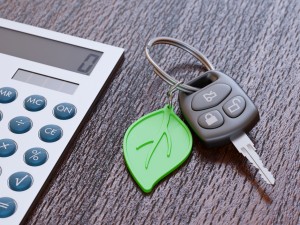The diesel bubble has well and truly burst.
It’s been clear for years that the emissions figures for diesel cars don’t stack up, but the last few months have shown that the fiddling of figures seems to be endemic in the industry.
So what now for the motorist who wants to pay less at the pump and reduce their environmental impact?
There really is only one choice, and that’s to go electric.
There are now 43,000 electric vehicles on British roads, including hybrid cars. That may only be 0.1% of the total, but it’s increased from less than 2,000 just two years ago, and the rapid uptake is showing no signs of slowing down. There are more EVs on the market than ever before as all major manufacturers now have an electric option, from small city cars to sports cars like the BMW i8.
Costs are coming down too. The Government offers a grant of up to £5,000 for anyone who purchases an electric or hybrid car, so you can get the world’s best selling electric car, the Nissan Leaf, from £15,790. This is cheaper than a VW Golf, which is of a comparable size and start at £17,595.
Obviously, the initial cost of the car has a big impact on the buying decision, but it really is only the start – prices at the pump and in the garage, as well as the resale value, makes all the difference in the long term, so let’s do the maths…
Nissan calculates that, if you’re charging at home, a Leaf costs just 2p per mile, a fraction of the price of a petrol or diesel car, which cost around 9-10p per mile. If you’re charging on the move, our Electric Highway enables you to charge your car totally free of charge using nothing but energy from the wind, sea and sun.
Garage costs are low too – EV engines have only a handful of moving parts compared to hundreds in a petrol engine, so there’s very little that can go wrong, and when it does it’ll be pretty simple to fix. As a rough estimate, maintaining an electric engine costs about one-third the current price of a petrol engine. The battery will wear down and can be costly to replace, but most electric car companies now offer a battery hire scheme, so you should have nothing to worry about.
It’s true that electric cars don’t currently hold their value as well as some petrol cars, but that is partly due to battery life concerns, so as the hire schemes become more popular that should become less of an issue. Even current figures aren’t too bad – a three year old Nissan LEAF is predicted to have a 47% residual value, so it will still be worth a fair amount by the time you’re due an upgrade.
And if all that’s not enough, fully electric vehicles are exempt from road tax and the London congestion charge, so that’s even more cash back in your pocket.

Now we know the maths adds up, it’s time to look at how an electric car works in practice.
An EV can be refuelled much like a petrol car, all you need is to plug a charging cable into the socket on your car. According to Nissan, a full charge for a new 30kWh Leaf will cover 155 miles between chargers.
We’ve installed nearly 300 electricity pumps across the road network in Britain – what we like to call the Electric Highway. If you’re going on a long journey, simply pull into a motorway services and plug in. The network enables drivers to charge their car up to 80% in just 20 minutes and travel the length and breadth of the country using nothing but renewable electricity. It’s only been up and running for the last three years but is already powering nearly two million miles a month.
Most EV drivers charge their cars at home, as the government will install a charging point onto a wall of your house absolutely free of charge. These will typically charge your car in eight hours, so people generally plug in when they get home from work and it’s ready to go by the time they wake up in the morning – essentially your house becomes your refuelling station. For a lot of people it’s the only charging point they need as 99.7% of car journeys are less than 20 miles, so the average driver can make up to five trips before needing to recharge.
And if you get Ecotricity for your home, then you’ll never have to touch a fossil fuel again to power your car – what could be better than that?
Moving to electric cars is essential if we want to lower our carbon emissions. Cars burn around 20 million tonnes of oil every year and produce 70 million tonnes of CO2 (12% of our total emissions) in the process.
If we remove petrol and diesel cars from our roads, we’ll feel the benefits both short and long term. Paris had a car free day back in September which led to a dramatic drop in both air and noise pollution as levels of nitrogen dioxide dropped by up to 40% in parts of the city and sound levels dropped by half. If Paris can see that much difference in only a day, just imagine what could happen over the course of a few years.
If electric cars are embraced fully by 2030, we could have over five million EVs and 11 million hybrids on the road. As a result, we would halve the carbon emissions from passenger cars and vans and save £1.2 billion to the economy in health benefits. It won’t just be at a national level that we’ll see a financial boon – by then, you’ll only spend £254 a year on travel, compared to an average of £1190 for traditional fuel cars in 2014.
The maths, technology and environmental benefits are all clear, so what are you waiting for?
You can read more about Ecotricity, who kindly penned this blog, here.




